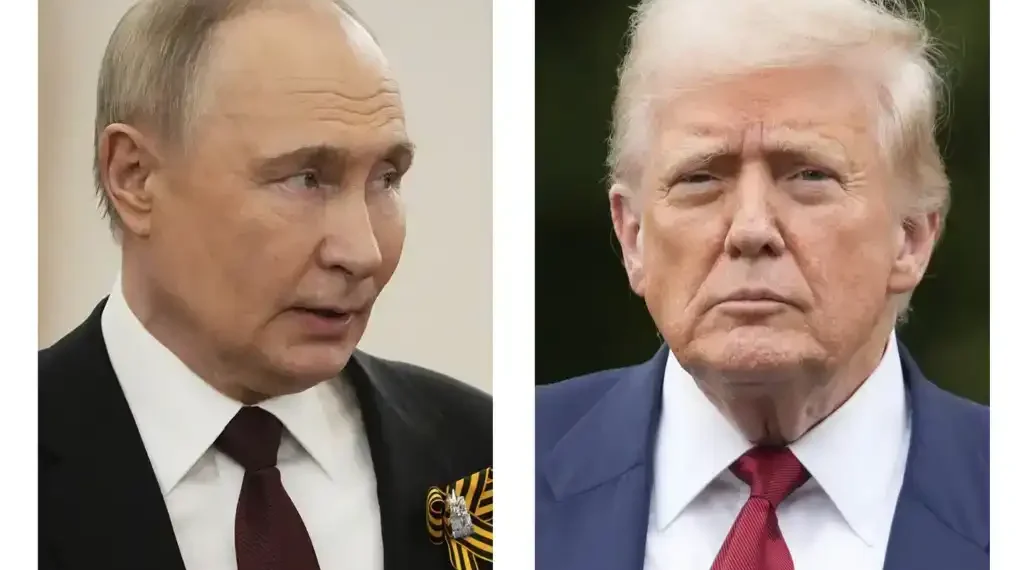Trump Signals Willingness to Meet Putin Despite No Planned Talks With Zelenskyy
Published: August 8, 2025, 14:00 U.S. Eastern Time
U.S. President Donald Trump stated Thursday that he is prepared to meet Russian President Vladimir Putin even if the Kremlin leader declines to meet Ukrainian President Volodymyr Zelenskyy. The comments come amid speculation that Washington and Moscow may soon hold a high-level summit, possibly in the United Arab Emirates.
The announcement has stirred debate among diplomats and analysts over whether bypassing Ukraine in such discussions could sideline Kyiv’s interests in ongoing peace efforts for the nearly three-year-long war.
Potential Summit on the Horizon
Putin earlier expressed hope for a meeting with Trump as soon as next week, potentially hosted in the UAE. However, White House Press Secretary Karoline Leavitt clarified that discussions over the meeting’s details are still underway.
When asked whether Putin’s participation in a summit would require prior talks with Zelenskyy, Trump responded, “No, he doesn’t. No.”
Initially, a U.S. official told The Associated Press that the absence of a Putin-Zelenskyy meeting would prevent a Trump-Putin summit. The official later revised the statement, saying it would only make such a meeting less likely. The comment was made on condition of anonymity due to the sensitivity of the matter.
A face-to-face between Trump and Putin would be a diplomatic boost for the Russian leader, who has consistently rejected Zelenskyy’s offers for direct talks. Putin has long hinted at a willingness to meet Trump to discuss ending hostilities in Ukraine.
Diplomatic Tensions and Deadlines
Putin’s remarks came just ahead of a White House deadline for Moscow to demonstrate progress toward ending the conflict or face additional economic sanctions.
Asked Thursday whether the deadline would remain in place, Trump said, “It’s going to be up to him. We’re going to see what he has to say. Very disappointed,” referring to Putin’s stance.
Putin, while not ruling out talks with Zelenskyy, said conditions must be “created” before such a meeting could happen. The Kremlin has previously stated that a meeting between the two leaders should only occur if a near-final agreement has been reached by their negotiating teams.
Concerns Over Ukraine’s Role
Ukraine fears being sidelined in direct negotiations between Washington and Moscow. Zelenskyy held calls with several European leaders Thursday, stressing the need for Europe’s direct involvement in ending the war.
“Ukraine is not afraid of meetings and expects the same bold approach from the Russian side. It is time to end the war,” Zelenskyy said, adding that any agreement must include a ceasefire and long-term security guarantees backed by the U.S. and European nations.
Despite Trump’s public calls for restraint, Russian attacks continue. A recent strike in Ukraine’s central Dnipro region killed four civilians and injured eight others, according to Kyiv officials.
Kremlin Priorities and U.S. Proposals
Putin’s foreign affairs adviser, Yuri Ushakov, emphasized that preparations for a productive bilateral meeting with Trump are the Kremlin’s main focus. U.S. special envoy Steve Witkoff had suggested including Ukraine’s leader in the summit, but Ushakov said the idea “was not specifically discussed.”
The announcement followed Putin’s meeting with UAE President Sheikh Mohammed bin Zayed Al Nahyan. Asked about who initiated the possible summit, Putin replied, “It doesn’t matter — both sides expressed an interest.”
Kirill Dmitriev, head of Russia’s sovereign wealth fund, said the talks could allow Moscow to present its position clearly and discuss mutually beneficial economic initiatives, including cooperation in rare earth element development.
Historical Context and Strategic Stakes
If held, the summit would mark the first U.S.-Russia leader meeting since 2021, when former President Joe Biden met Putin in Geneva. While Trump has claimed he could broker a deal to end the war, there is no guarantee such a meeting would yield a breakthrough, given the deep divide between Moscow and Kyiv over peace terms.
The war has killed tens of thousands of soldiers from both nations and more than 12,000 Ukrainian civilians, according to United Nations figures. Western officials accuse Putin of prolonging the conflict to secure more territorial gains.
Trump’s early second-term approach to Putin was conciliatory, echoing some Kremlin talking points. Recently, however, he has expressed growing frustration, criticizing Putin for resisting U.S.-led peace proposals and warning of new sanctions if progress stalls.
Shifting Ukrainian Public Opinion
A new Gallup poll suggests Ukrainians’ attitudes toward negotiations are shifting. Conducted in early July, the survey found that about 70% of Ukrainians now support pursuing a peace settlement as soon as possible — a stark reversal from 2022, when three-quarters favored fighting until victory.
Support for prolonging the war has declined across all regions and demographics. The poll excluded territories under Russian control, representing roughly 10% of Ukraine’s pre-war population.
Mixed Reactions in Kyiv
In Kyiv, residents voiced contrasting opinions on the potential Trump-Putin meeting.
“Negotiations are necessary, and we all want the war to end… because it will only end with talks,” said Ruslan Prindun.
Others were skeptical. Volodymyr Tasak argued it was “unlikely anything good” would come from the talks and feared Zelenskyy was being pushed aside. Lyudmila Kostrova believed Putin’s interest in meeting Trump was aimed at avoiding further sanctions rather than ending the war.
This article was rewritten by JournosNews.com based on verified reporting from trusted sources. The content has been independently reviewed, fact-checked, and edited for accuracy, neutrality, tone, and global readability in accordance with Google News and AdSense standards.
All opinions, quotes, or statements from contributors, experts, or sourced organizations do not necessarily reflect the views of JournosNews.com. JournosNews.com maintains full editorial independence from any external funders, sponsors, or organizations.
Stay informed with JournosNews.com — your trusted source for verified global reporting and in-depth analysis. Follow us on Google News, BlueSky, and X for real-time updates.














